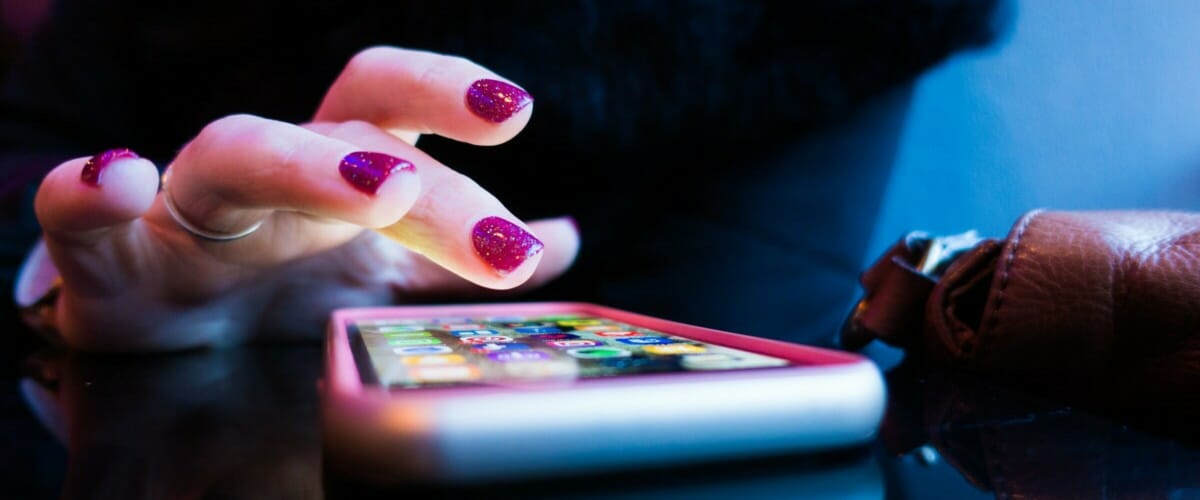Exhausted, I massaged my temples with my index fingers and took another swig of the now-cold coffee from my mug. I had been starting at zoom meetings for hours, and I was struggling to find the willpower to start up another one. Is this what pastoring has to look like in 2020?
As I shared the word of knowledge, I was stunned by the stream of comments coming in: “that’s me!”, “that’s exactly what I’ve been experiencing for years!” I began to invite the Holy Spirit to come, and another flood of input as pain decreased and Jesus’ healing began to flow in rooms all around the world.
In a way no one saw coming, 2020 forced the church to engage with technology—both its blessings and its drawbacks—and figure out new ways to work to partner with the kingdom of God. In an instant, ministry was forced nearly entirely online, and whether we participate in church leadership or not, we’ve all had to learn to engage our spiritual journey with tools like zoom calls and Facebook lives. As with any disruption, we have experienced both the excitement of the new and the loss of the old intermingled together.
Pivot points like this tend to be irreversible. Once cars are more-or-less commonplace, there is no going back. Once the TV has become “normal”, it stays normal. How exactly will the church continue to engage technology during the pandemic? What about after the pandemic? No one knows, but I would suggest that Pandora’s box has been opened and it’s not going back.
Technology & “Mindspace”
The technology that has become ubiquitous in our 21st-century lives is distinct in that it merges with our daily lives to the extent that it is never very far from our minds. This is very distinct from, say, the invention of the car. A car is on your mind and you engage with it mentally when you’re on the road, but once you arrive and get to where you want to go, we mentally “set the car down” and engage that mental energy with the tasks of the moment instead. The “car mind space” has really well-defined limits, which regulates the amount of attention our car asks for on any given day.
Over the last century, innovative technologies have increasingly taken a different direction. Rather than have a well-defined space of usefulness and cleanly regulated mental engagement, technology has increasingly become always on, waiting for you. The radio was probably the first step in that direction, then followed by television, computers, the internet, and currently the smartphone. These technologies don’t have a clear utility that shapes the way we use and interact with them, they provide an opportunity for endless engagement, requiring us to make a conscious choice to engage and perhaps, more importantly, to disengage.
In time, these “always-on” technological platforms seem to have a way to migrate to advertising-driven revenue models. When that happens, our attention becomes a resource the companies that maintain these platforms use to make money; they monetize by selling our attention to advertisers. (For social media specifically, this has been documented in the recent Netflix documentary, The Social Dilemma. One piece this leaves out is how social media is just the latest—and most effective—in an ongoing trend that follows technology-as-entertainment as a whole).
In an effort to make the advertising effective, much of it is created to quickly arrest our attention; it’s organized around interrupting us and seizing our attention. This was taken to the next level with smartphones in particular because they are empowered to request our attention. With the TV or a computer, it’s off until you choose to engage with it. With smartphones, they ask for us to give them our attention as the ding and buzz us with all the things we may be “missing out on” in real-time. It might not seem like it, but these companies spend millions of dollars to work to figure out how to get more of our attention, so advertisers can spend millions more dollars working to get us to buy what they want us to. It’s not obvious at first, but in the 21st century, we live in a time when some of the richest and smartest people in the world are working to sculpt our attention towards a certain engagement. The key lesson for 2020 is this: whether we are intentional about how we steward our attention or not, someone else is being intentional about how you steward your attention.
Before we continue, I want to pause and point out that this presents a discipleship task that is unique in its importance in the 21st century; teaching people to safeguard their attention. The potential negative effects of all of this on our lives are absolutely real and scaled to the level of prevalent use in society, we have a huge task/opportunity in front of us.
Attention and the Holy Spirit
My journey with the Holy Spirit timed out in an interesting way when it comes to this subject. I first met the Holy Spirit in my trip to China in late 2008. Over the next few years, a lot of my focus was on learning to walk with the Spirit, and in the time since then I’ve spent a lot of my focus on learning to equip others to walk with the Spirit. This, interestingly, timed outright as the smartphone was being released and becoming ubiquitous. The first iPhone was released in mid-2007. I remember getting my first smartphone a few years later a little after the iPhone 4 came out in 2010 and being stunned by how much fun, how “shiny” the whole thing was, and how many things seemed so easy now that I had it. This incidentally timed out at about exactly the same time I came on staff at my home church and began to pastor and train others to walk in Holy Spirit ministry.
As both of these paths continued to develop (the path of being a pastor who was heavily focused on the Spirit, and the path of being a smartphone user), I noticed a growing tension between them. It took me a long time to piece together what was happening, but I eventually realized that learning to be effective at Holy Spirit ministry involves becoming a careful steward of our attention. In fact, in my experience, learning to steward my attention purposefully is one of the most important things I’ve ever invested in as it comes to walking in the power of the Spirit.
In an explanation about his miracle-working ability to the Pharisees, Jesus says it this way:
So Jesus said to them, “Truly, truly, I say to you, the Son can do nothing of his own accord, but only what he sees the Father doing. For whatever the Father does, that the Son does likewise. For the Father loves the Son and shows him all that he himself is doing. – John 5:19-20a ESV
Notice the two things Jesus says. He only can do what he sees the Father doing. There are two steps: (1) seeing and (2) doing. These two: (1) perception and (2) obedience are the process that Spirit-empowered ministry always follows, and the second is contingent on the first. You don’t even get the chance to obey if you don’t see what God is doing in the first place. And here is the kicker; seeing is about attention. The difference between whether something is in your field of view and whether you see something is whether your attention goes to it.
You can probably see where all of this is going. God is constantly doing things in our world; like his Son, he loves us and shows us what he is doing as well. What I’ve found is this: the mental patterns that are cultivated by the way technology would train us are antithetical to our ability to see what God is doing when it comes into our field of view. You can’t have your attention trained to the world and to be tuned into the Lord at the same time.
For the mind that is set on the flesh is hostile to God, for it does not submit to God’s law; indeed, it cannot.” – Romans 8:7 ESV
The mind tuned in to the stuff of this world—the flesh—doesn’t align with where God is going. It just doesn’t work that way.
So What Do I Do?
At this point you may be asking some interesting questions: am I just supposed to get rid of my phone? Or swear off social media? What does stewarding my attention look like? These are great questions, and I’m certainly not advocating a technology-free life. No, what I suggest is that you become more intentional to steward your attention than your technology is. One of the best things I’ve ever done is DTR with my smartphone and determine that I wanted to choose to engage with it, not have it grab my attention. I turned off all notifications (except for texts, which even still, show up but don’t vibrate or ding). When someone emails me, I don’t know it, unless I look. When someone tags me on social media, I’m blissfully ignorant, until I choose to log in and look. In fact, when I log in to Facebook, I’ve set it up so I don’t even get a newsfeed. The only way my phone can take my attention is when someone calls me – and not even everyone can do that. It’s brilliant; I have a portal to the digital world that leaves me alone until I choose to go there. I’m in control of when it gets my attention, not it.
When I made the change, I was shocked at how much detox I went through at first, and then how much happier and more peaceful I felt. The constant frenzy of keeping up with the digital world is a recipe for a jumbled soul and a heavy heart. And you know what? I’ve never missed it, and I’ve never missed anything important that made me wish I had allowed my phone to notify me. Not once, in years.
Now briefly, just to circle back to see the positive momentarily here, yes, there are incredible advantages to technology as well! I doubt this article would be in your hands without it. God is doing plenty of amazing things through all kinds of technological avenues, and I do want to celebrate that. I just also want to be purposeful to be counting the cost as well. Gaining the whole world and losing our soul isn’t a great bargain at all, and I’m concerned that for many a degree of that is happening.
It seems to me that if you go for 100% of what the Spirit can do through you, getting serious about your attention in some way like this makes a huge difference. If not, sure, you can pray for people and you’ll see them get healed sometimes. You’ll get words that land; it’s not that nothing will happen, it’s that you won’t get into the deep places of the Spirit where you’ll see God’s power pour out dramatically and life-defining encounters. You’ll be stuck in the shallows because your attention is as much consecrated to your email or social media as it is to the Lord.
(You know you want to: here is how you turn off notifications. You’ll thank me, once you detox from the tech addiction)
This is an updated edition of a post originally published on Putty Putman
Featured Image by Rob Hampson on Unsplash




















Comments are closed.